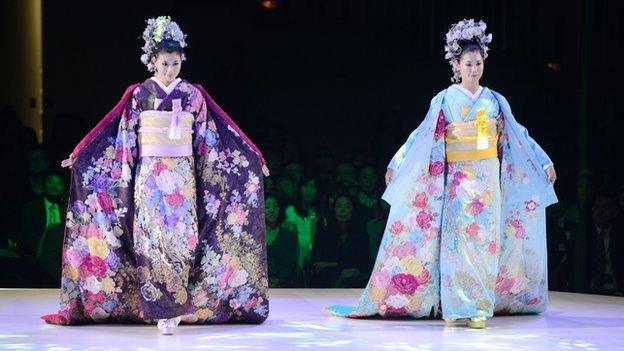Why growing numbers are saying 'yes' to themselves
- Published

Laura Mesi spent £8,700 on her solo wedding, complete with white dress, wedding cake and 70 guests
More and more people around the world are choosing to "marry" themselves in symbolic ceremonies, and businesses are catering to the trend. But what motivates someone to say "yes" to themselves?
In the summer of 2000, New York-based performance artist Gabrielle Penabaz decided to throw a wedding party for herself while nursing a broken heart.
She carefully chose a location, flowers, a quartz ring, a sweetheart-neckline wedding dress and wrote thoughtful vows.
She even wore "something borrowed, something blue" on the day, even though the event was purely symbolic and lacked one crucial component: a groom.
Nonetheless, her friends and family attended and Ms Penabaz says she had the "best wedding ever". Since then she has been "officiating" at other people's self-marriage ceremonies as a form of performance art - a service for which she charges.
Her clients are usually single women, although people from all genders and marital statuses have taken part.
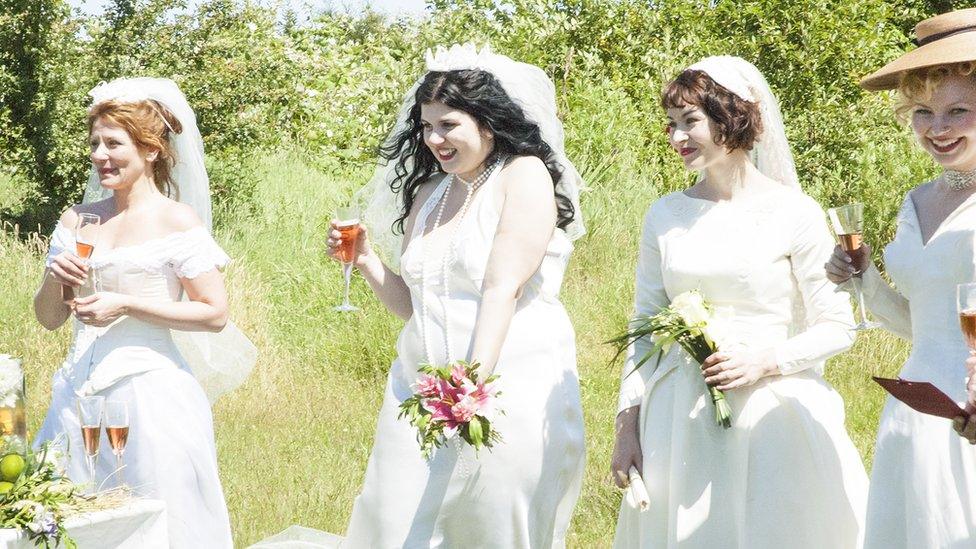
Women attending a self marriage ceremony in Canada
She claims to have "married" more than 1,500 people, typically in ceremonies like her own, with mock-up chapels, costumes, cakes and most importantly, vows.
"The ceremonies are usually very cathartic and all about self-love," Ms Penabaz says.
"80% of the people whom I married to themselves shed a tear reading their vows. They usually say things like 'I forgive myself' and 'I will no longer call myself ugly'."
Welcome to the world of self-marriage or "sologamy", which has attracted increasing attention over the last few years.
While it is not legal to marry yourself anywhere in the world, reports of people holding mock ceremonies go for several decades and can be found everywhere from Japan to Italy, to Australia and the UK.
The act has also been the theme of episodes of popular US TV shows such as Glee and Sex and the City, and there are now whole businesses - such as Ms Penabaz's - dedicated to helping people plan their solo events.
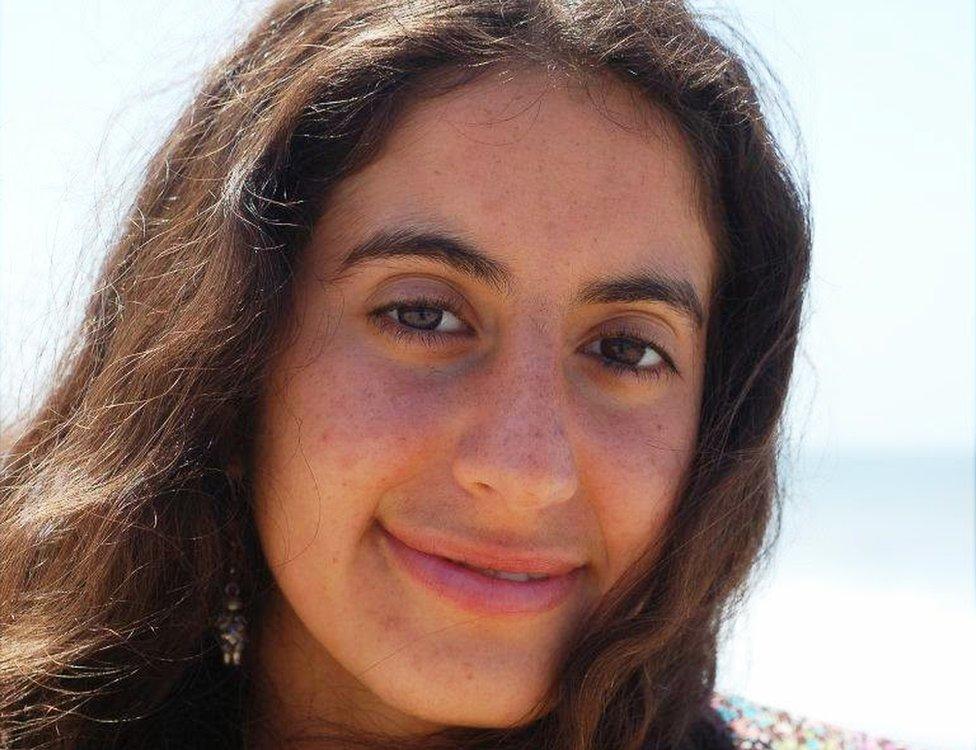
"A ceremony can be anything from a simple ritual to a more lavish celebration," says Dominique Youkhehpaz
Dominique Youkhehpaz officiated at her first solo wedding in 2011 at the US arts festival Burning Man and has since set up the consultancy Self Marriage Ceremonies.
She offers a 10-week online course to prepare brides or grooms for sologamy, costing $200 (£149), as well as private counselling sessions. Ms Youkhehpaz says she's worked with more than 250 clients to date and business is booming.
"A self-marriage ceremony can be anything from a simple ritual in one's bedroom to a more lavish celebration," she explains.
She also thinks it can be incredibly therapeutic for those who take part. "I have witnessed people leave abusive relationships, step more fully into their life's work or meet their beloved after marrying themselves."
Proponents say sologamy is about self-love, acceptance and claiming the social affirmation normally reserved for couples who wed.
While there are no official figures about those choosing to marry themselves, the interest comes at a time when the number of unmarried people is at record highs in many advanced economies, according to the OECD.
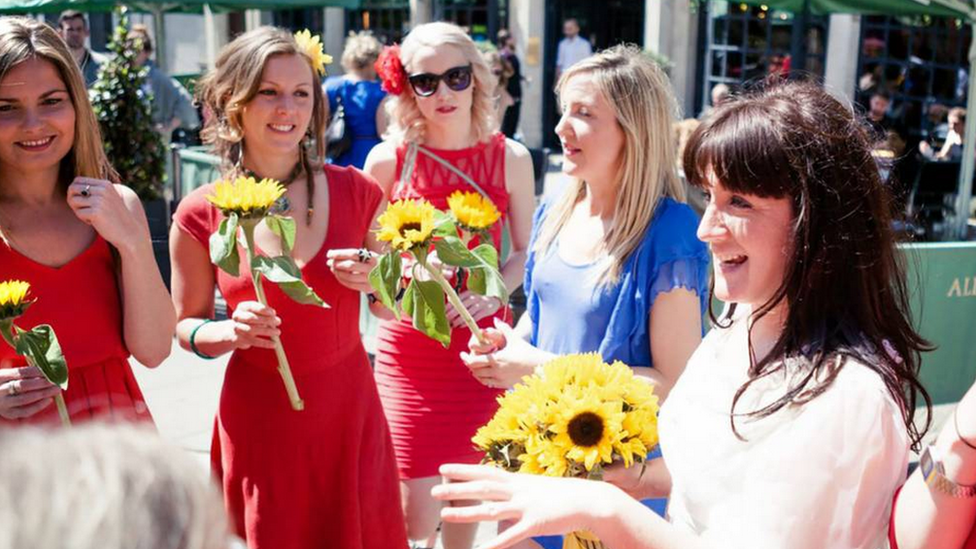
Briton Sophie Tanner tied the knot with herself after her partner cheated on her
Not surprisingly, businesses have been catering to this new market. In 2014, the Japanese travel agency Cerca Travel reportedly offered a two-day package for solo brides for upwards of £2,500. It included dress fitting, make-up and hair styling and a photo shoot.
Dan Moran, a Los Angeles-based jewellery designer, says he started receiving calls from clients wanting sologamy rings 18 months ago and wedding planners and photographers he knows are getting similar requests.
Most of his new clients are "urban, affluent and educated" women, and interestingly many are already married.

More stories from the BBC's Business Brain series looking at interesting business topics from around the world:

"In the coming years, people who work in the wedding industry will definitely have to keep sologamists in mind and tailor their service," he says.
Certainly people are willing splash out on sologamy. Italian Laura Mesi wed herself at a "fairytale" event this September, complete with a white dress, three-layer wedding cake, bridesmaids and 70 guests.
The 40-year-old, who made the move after her 12-year relationship ended, spent £8,700 on the day.
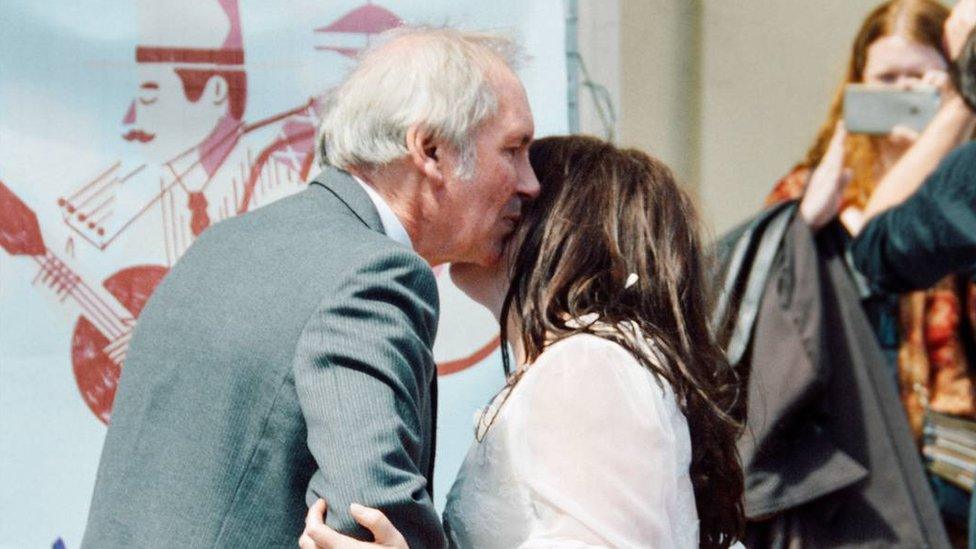
"It was the best day of my life," says Sophie, here hugging her father - who gave her away
In the UK, Sophie Tanner married herself in 2015. "For me, it was an important ceremony that demonstrates my commitment to self-compassion, " she told the BBC.
"The wedding was the best day of my life, complete with vintage gown, teary dad giving me away, and dancing bridesmaids."
But not everyone welcomes the sologamy trend. Some call it narcissistic and others criticise it as a pointless submission to a patriarchal institution.
Karen Nimmo, a clinical psychologist in New Zealand, says: "Self-dislike is at the root of so many psychological issues, so where marrying yourself is about healing from past trauma or relationship issues it can be helpful.
"But it's important to make sure your other relationships are healthy. If you rely too much on yourself and constantly put your own needs ahead of everyone else you may be slipping into narcissistic territory - and that's an unhealthy and lonely place to be."
Alexandra Gill, co-founder of consultancy Marry Yourself Vancouver, accepts marrying yourself "kind of is" narcissistic, but adds: "Aren't all traditional white weddings also narcissistic?"
She also says that marrying yourself doesn't have to be taken deadly seriously.
Since 2011, her firm has helped solo brides plan their big days, but is now branching out to offer a "ladies' night" concept which celebrates "self-love and sisterhood".
"Let's face it, all women grow up with the fairytale wedding stories and the princess culture isn't going away anywhere," she says.
"But self-marriage ceremonies allow us to re-write this narrative in which we don't need a groom."
"Weddings have always been a female-centred celebration, anyway," she says.
"Many more women would love to marry to themselves, but they're just self-conscious about it."
Sex in the City's heroic protagonist Carrie Bradshaw, who wed herself in a 2003 episode of the series, would surely agree.
- Published27 September 2017
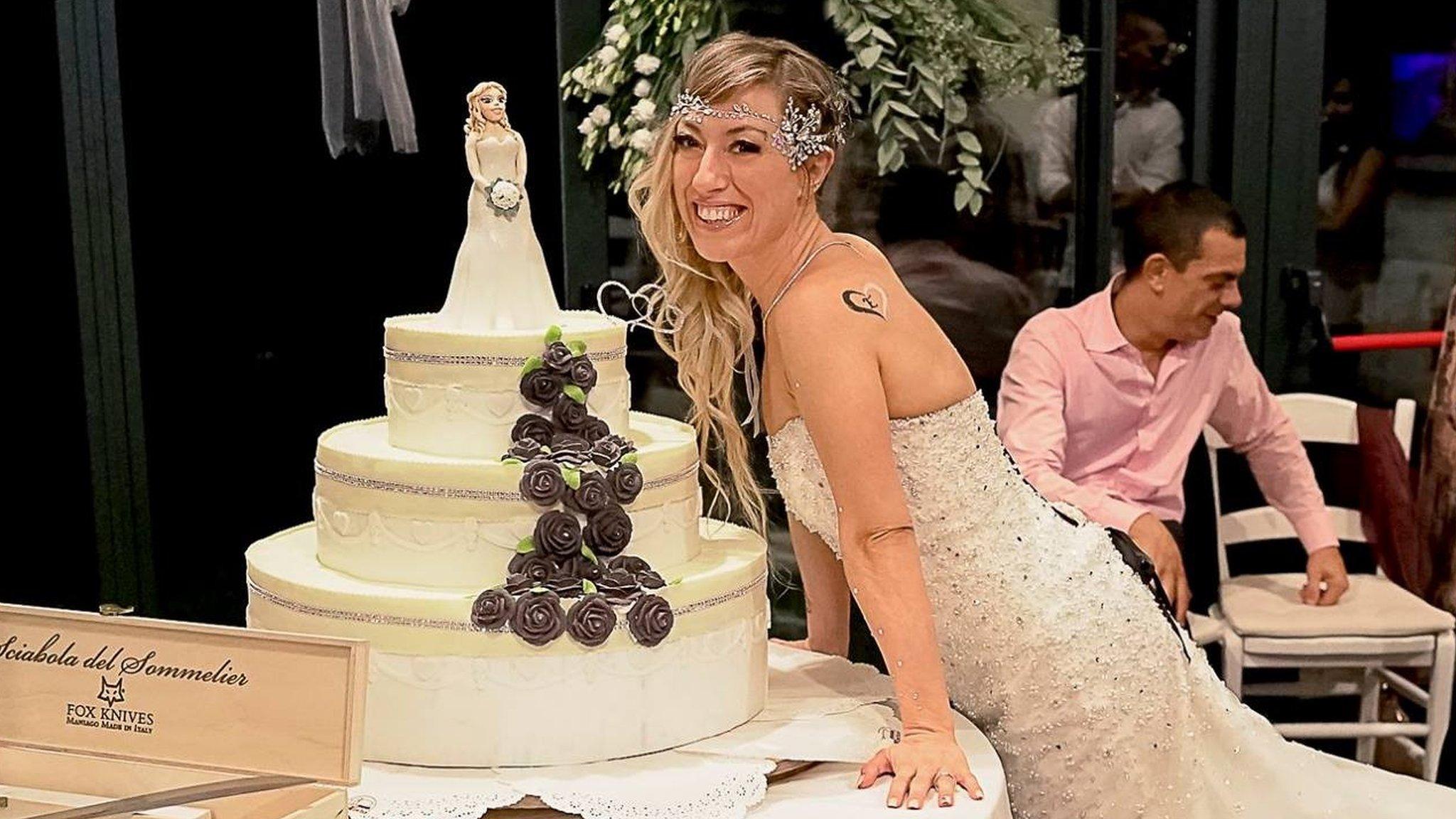
- Published22 December 2014
